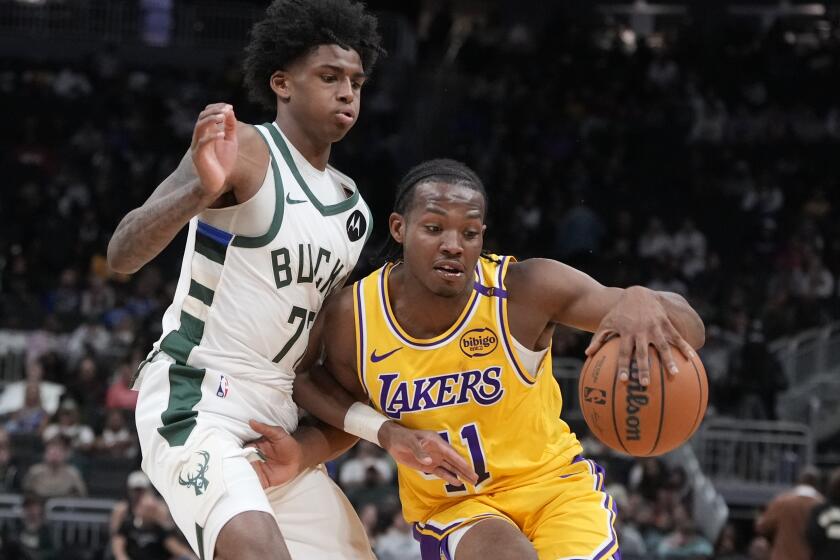THE HUMAN CONDITION / WHY WE MAKE SMALL TALK : Little Chats That Play a Big Part in Our Lives
Hi there. How’s it going? . . .
Oh, fine. Fine. How about this weather, huh? . . . Well, I guess we can always use the rain.
So what do you think of the Lakers’ chances this year?
What’s that? This story? Oh, just a little look at small talk. You know, those seemingly meaningless conversations you have dozens of times a day. Maybe you’re waiting for the elevator. Or in line at the bank. Or in a hallway or at a party.
Yeah, I know. It all seems pretty trivial. Idle chatter about traffic doesn’t do much more than fill the air with empty words that are quickly forgotten. But you should know that small talk actually has a big place in our lives.
“We need it,” says Dana Gould, a Los Angeles-based comedian. “We need to seize any form of communication with each other because we have so few left.”
Then there’s Small Talk Gone Bad.
Pat Oliver, assistant professor and chair of the communication arts department at Loyola Marymount University, says that left unchecked, small talk can be “an invasion. It’s so powerful. It does something to you.” Almost without exception, small talk is done right, according to the pros.
“I come into my office every morning and start the day with small talk with my secretary,” Oliver says. “I come in after spending an hour and a half on the freeway raring to do business, but that doesn’t always happen. . . . If I don’t make that small connection with another person, I can’t work. I need that bonding that will carry me through the day.”
What causes ST?
As a rule, you’re either trying to yank somebody into your life, or you’re using conversation as an invisible force field to keep them out.
“You can be wanting to connect with another person, and small talk is your entree to more meaningful conversation,” says Oliver. “Or it may be used to push some away so as to not have any meaningful conversation. Each approach is probably used with the same frequency.”
The way people use small talk is usually determined by where they happen to be at the time. Take the elevator, for instance. Now there’s prime territory. Nobody knows anyone and there’s no reason to start a conversation, but invariably, someone does.
Making conversation in such peaceful social settings, according to Oliver, “can confirm your territory. It’s a way of feeling liked and accepted.”
Or it can be a geographical thing.
“Being a Southerner, that’s the hardest thing for me,” explains actress Park Overall, co-star of the NBC sitcom “Empty Nest.” “I just can’t stand those embarrassing silences. . . . When I’m at a Beverly Hills party, I’ll ask the wives of powerful men what it’s like to be married to those men.”
Concurs Mark K. Smith, who works as an administrative assistant in the personnel department for the May Co., “I actually hate to hear silence. If I’m in a car and it’s quiet, I always have to start a conversation.”
The topics of small talk don’t matter. In fact, you don’t want anything more taxing than weather or traffic. It’s non-threatening talk in a threatening situation. However, the rules change quickly when you’re with lots of people doing lots of talking.
Let’s say you’re at a party. Or perhaps you’ve gone to a bar with friends. There’s no way to avoid social interaction. Now it’s time to use small talk as a way of making others feel more comfortable around you, so you don’t look silly standing by the food table alone all night.
Kenny Green hears it all the time. He’s a bartender for the Red Onion, a restaurant and nightclub in Huntington Beach, and he knows exactly what it takes to make successful social small talk.
“The guys talk about themselves--their jobs, their finances, whatever. Girls talk about everything but the guy and themselves,” he explains. “Talking about the music that’s playing is usually a pretty good call. That’s easy small talk. And things like, ‘Come here often?’ That gives you some security.”
This verbal mating ritual can go on for up to 20 minutes, according to Green’s unscientific observations. If the talk remains small, it’s probably time to move on.
“It varies a little from person to person, but I think most people intuitively know how long small talk should go on,” says Oliver.
The ultimate goal for this sort of conversation, whether it takes place on the nightclub dance floor or the office corridor, is power. If you do it well, you’re in control. You can get what you want out of someone else. Nowhere is this more evident than in the workplace.
“When I screen job applicants, I try to make casual talk with them. I ask things like, ‘Do you live in the area?’ or ‘Did you see “In Living Color” the other night?’ just to loosen people up,” says Smith. “If they give me one-word answers and don’t really talk back, I put an X on their application. It shows me he or she isn’t a people person, and when you’re working in a store, being able to make small talk is definitely a valuable job skill.”
Cathy Carey certainly agrees. She’s a Beverly Hills dental hygienist, and although her occupation may not require that she speak fluent small, it certainly makes things a lot easier.
“I don’t have to do it, but the job can get monotonous sometimes and the only gratification is to try talking with the patients,” she says. “Most people appreciate it. It helps them relax. I get them to relate to a part of me, and that way I seem like more than just a white coat.”
She may start by discussing the weather or complimenting a patient on his or her outfit. However, the small talk doesn’t have to stick with such safe subjects. A patient might get so wrapped up in chatting that the conversation can easily veer into such uncertain territory as one’s sex life.
This may be heavy stuff, definitely not the sort of thing you’d think someone would casually discuss with a stranger. Still, in the appropriate setting, there are very few rules as to what qualifies as small talk.
“If I’m on a plane and within a very few minutes someone is talking about a death in their family or their finances, it astonishes me,” says Oliver. “That’s the sort of thing I wouldn’t bring up while, say, walking down the hall at the university talking with someone.”
Therein lies one of the big drawbacks to small talk. It could alienate two people as easily as it can bring them together.
Carey recalls flying back from an uncle’s funeral and her seatmate “talked the entire way. I decided next time I flew I’d ask to be seated in the no-talking section.”
Incidents like this serve as a reminder that while it’s easy enough to start small talk, stopping it once it becomes an annoyance is not so easy. Chances are the person doing the talking really needs to make that connection and has to be let down easy.
You could try Gould’s approach.
“If you don’t want to converse with someone, just make a comment about the Lord.”
Small Talk Through the Ages From the high chair to the rocking chair, small talk is a part of our being. Some of the greater opening lines:
* The Young Years: That’s a pretty doll. What’s her name? Do you come to this sandbox often?
* The Youthful Years: What’s your major? Do you change majors often?
* The Bar-Going Years: What’s your sign? Do you come here often?
* The Golden Years: How many grandchildren do you have? Do you see them often?
More to Read
All things Lakers, all the time.
Get all the Lakers news you need in Dan Woike's weekly newsletter.
You may occasionally receive promotional content from the Los Angeles Times.









